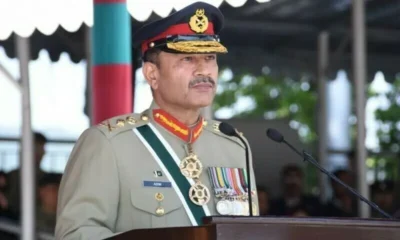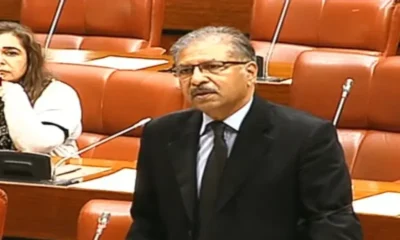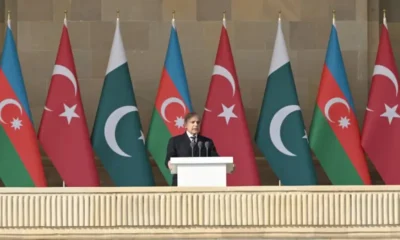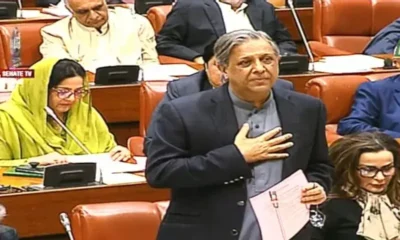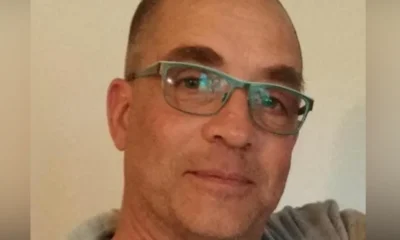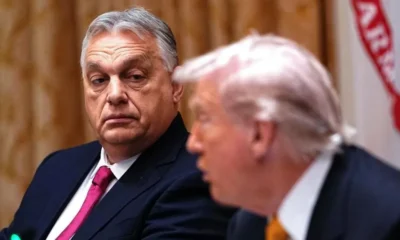American News
Trump administration tells states to stop paying full food aid benefits

The Trump administration is ordering US states to stop paying full food aid benefits to low-income American families, saying they are “unauthorized”.
A memo from the US Department of Agriculture, which runs the Supplemental Nutrition Assistance Program (Snap), said states can deliver just 65% of benefits after the Supreme Court allowed the administration to withhold some funding pending further legal hearings.
More than 42 million Americans who rely on the food aid began receiving only partial benefits this month due to the ongoing US government shutdown.
Some states had been issuing full benefits after a federal judge last week ordered the Trump administration to fully fund the programme.
The USDA memo directs states, which administer the programme that relies on federal funds, to stop paying out 100% of November’s benefits and to claw back any funds they have already distributed above the 65% threshold.
“States must immediately undo any steps taken to issue full SNAP benefits for November 2025,” the USDA said in its Saturday memo.
If states don’t comply with the latest guidance, the agency warned it may cancel federal funding for state administrative costs, and hold states “liable for any overissuances”.
The BBC has contacted the White House and the USDA for comment.
The latest memo comes after the USDA told states on Friday that it is working towards issuing full benefits as it sought to comply with a lower court order requiring it to do so using emergency funds. The Supreme Court later paused that lower court order.
New York, Massachusetts, California, Wisconsin, and Pennsylvania are among the states who had begun paying out full benefits to Snap recipients.
Wisconsin Governor Tony Evers, a Democrat, wrote in a Sunday post on X that his response to the request to return the benefits was a simple “no”.
Massachusetts Governor Maura Healey said in a statement that if “President Trump wants to penalize states for preventing Americans from going hungry, we will see him in court”.
The Democratic governor said the funds had already been sent to recipients late last week in accordance with the earlier guidance received from the USDA.
The clawback request is the Trump administration’s latest move in the funding battle over Snap, also known as food stamps, as the longest government shutdown in US history drags on.
The legal saga was spurred after the USDA announced benefits would be halted in November due to the lack of funding over the shutdown.
On Friday night, the Supreme Court issued an emergency order temporarily allowing the Trump administration to temporarily withhold $4bn (£3.04bn) of funding for the benefits while it appeals the lower court’s order.
The Snap programme is used by around one in eight Americans and costs almost $9bn (£6.9bn) a month.
A family of four on average receives $715 per month, which breaks down to a little less than $6 per day, per person.
American News
Shutdown could reduce US flights ‘to a trickle’, transport secretary warns

Flight delays and cancellations continue to snarl US air travel for a third day as Transportation Secretary Sean Duffy warned air traffic will be “reduced to a trickle” if the US government shutdown continues.
Roughly 1,400 flights to, from, or within the US were cancelled and 2,700 delayed on Sunday morning, according to flight tracker FlightAware. The longest delays were reported in Newark, New Jersey – more than two hours on average.
In a hopeful sign, lawmakers are working on a possible deal to reach a compromise on government funding and end the shutdown, according to US media reports.
The Senate was scheduled to convene on Sunday in a rare weekend session.
Duffy warned the impacts on air travel will grow dire if they do not break the stalemate soon.
“You’re going to see air travel be reduced to a trickle,” he said on CNN on Sunday. He added that travellers trying to fly home for the Thanksgiving holiday later this month may not be able to get there.
“Many of them are not going to be able to get on an airplane, because there are not going to be that many flights that fly if this thing doesn’t open back up,” he said.
The Federal Aviation Administration (FAA) announced last week that it would be reducing air travel capacity by up to 6% this weekend and 10% by next weekend at 40 of the nation’s busiest airports. The cuts do not apply to international flights, but some airlines may choose to also cancel some of those flights, the FAA said.
Air traffic controllers, who are not being paid during the shutdown, are reportedly fatigued and not coming to work, triggering the reductions in air traffic allowances.
Duffy said Defence Secretary Pete Hegseth offered to have military air traffic controllers step in to help but he declined the offer because they are not certified to direct air traffic at the civilian airports.
Altogether, hundreds of thousands of federal workers are not being paid since the Government ran out of money on 1 October. Food assistance for low-income Americans also has been in limbo, with the administration agreeing to pay only half of monthly benefits.
Sunday marked the 40th day of the longest shutdown in history as Republicans and Democrats still have not agreed on a funding resolution to reopen the government.
Republicans and Democrats have blamed each other for causing the impasse and for the travel disruptions.
The White House on Friday said Democrats are “inflicting their man-made catastrophe on Americans just trying to make life-saving medical trips or get home for Thanksgiving”.
Meanwhile, Senate minority leader Chuck Schumer on Saturday accused Republicans of “playing games with people’s livelihoods”.
Democrats have refused to back any Republican spending plan unless money for health insurance subsidies be included, while Republicans want to provide funding for the government without anything else attached.
President Donald Trump suggested over the weekend money should be sent directly to Americans to buy health insurance rather than to insurance companies.
Republican senators are working on a compromise package that could end the impasse with a vote to advance legislation possibly coming on Sunday.
American News
What Hungary’s Orban did – and didn’t – get from Trump

On the surface, the Hungarian prime minister’s trip was exactly what he went to Washington for: luxuriant praise and an exemption from sanctions on Russian oil, gas and nuclear supplies.
And all that just five months out from a difficult election.
Look closer, however, and the picture is less clear cut. The US side struck a hard trade deal – and an expensive one for Hungary.
And there’s no progress on Viktor Orban’s biggest headache: ending the war in neighbouring Ukraine, and with it the long shadow the conflict casts over Hungary.
Let’s look first at Orban’s key win – an exemption from US sanctions, which a White House official told the BBC was time-limited to one year, although Péter Szijjártó, Hungary’s foreign minister, said would be indefinite.
The time span is interesting. Trump clearly wants to help his friend win the election in April. And the exemption even partially dovetails with the European Commission demand to all member states to end the import of Russian oil, gas and nuclear fuel by the end of 2027.
What is missing, from an EU perspective, is any political commitment from Orban to meet that demand – a commitment made and fulfilled by the Czech government. And the EU is trying to tighten energy sanctions – to the fury of Hungary and Slovakia.
Away from the media spotlight, the Hungarian energy company MOL has been upgrading two of its refineries – Százhalombatta in Hungary and the Slovnaft facility in Bratislava – to process Brent crude instead of the high-sulphur Urals crude which flows through Russian pipelines.
On Friday, MOL said 80% of its oil needs could be imported through the Adria pipeline from Croatia, albeit with higher logistical costs and technical risks.
So Orban’s argument, which so impressed Trump, that Hungary, as a landlocked country, has no alternative to Russian oil may not strictly be true.
Overall, Hungary and Slovakia have together paid Russia $13bn (£10bn) for its oil between its full-scale invasion of Ukraine in February 2022 and the end of 2024.
The one-year window granted by the US is nevertheless a valuable respite for Hungarian households this winter.
Orban told pro-government reporters who travelled with him to Washington that otherwise utility bills “could have gone up by up to three times in December”. Capping those bills by various means has been a central plank of his popularity in Hungary since 2013.
Under the US exemption, Hungary can also continue to buy Russian gas through the Turkstream pipeline, which traverses the Balkans, and pay for it in hard currency ($185m in August alone) using a Bulgarian loophole. Orban has agreed to buy LNG from the US worth $600 million, according to Bloomberg.
Another key part of the Washington deal is nuclear.
Hungary agreed to buy US nuclear fuel rods for its Paks 1 nuclear power station (at a cost of $114m), in parallel to those bought from Russia’s Rosatom and France’s Framatome.
Russian plans to finance and build the nuclear extension, called Paks 2, have been long delayed by technical and licensing issues. The US agreement to lift all nuclear sanctions on Hungary may help restart that project, but thorny problems remain.
Hungary has also agreed to buy US technology to extend the short-term storage of spent nuclear fuel at Paks for between $100m and $200m.
American News
US to boycott G20 in South Africa, Trump says

Donald Trump has said the US will not attend the G20 summit in South Africa over widely discredited claims that white people are being persecuted in the country.
The US president said it was a “total disgrace” that South Africa is hosting the meeting, where leaders from the world’s largest economies will gather in Johannesburg later this month.
South Africa’s foreign ministry described the decision by the White House as “regrettable”.
None of South Africa’s political parties – including those that represent Afrikaners and the white community in general – have claimed that there is a genocide in South Africa.
Trump posted on his social media platform Truth Social: “It is a total disgrace that the G20 will be held in South Africa.
“Afrikaners (people who are descended from Dutch settlers, and also French and German immigrants) are being killed and slaughtered, and their land and farms are being illegally confiscated,” he wrote.
“No US government official will attend as long as these human rights abuses continue.”
Trump had earlier said South Africa should not be in the G20 at all, and that he would send vice-president JD Vance, instead of attending himself.
But now the White House says no US official will go.
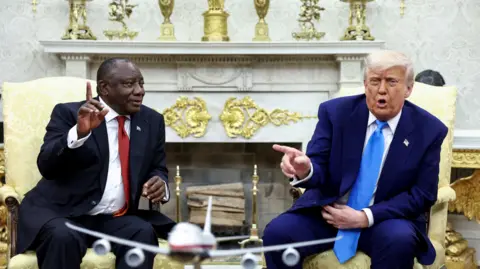
Every year, a different member state hosts the G20 and sets the agenda for the summit – with the US due to take its turn after South Africa.
The South African foreign ministry said in a statement: “The South African government wishes to state, for the record, that the characterisation of Afrikaners as an exclusively white group is ahistorical.
“Furthermore, the claim that this community faces persecution, is not substantiated by fact.”
Since returning to office in January, Trump has repeatedly accused South Africa of discriminating against its white minority, including in May when when he confronted his South African counterpart Cyril Ramaphosa in the Oval Office.
The Trump administration has given Afrikaners refugee status, stating a “genocide” is taking place in South Africa. Last week, the White House announced plans to cap refugee admissions at a record low, and give priority to white South Africans.
South Africa’s government said the claims of a white genocide is “widely discredited and unsupported by reliable evidence” and pointed to the “limited uptake” of this offer by South Africans.
The claims were dismissed as “clearly imagined” by a South African court in February.
The G20 was founded in 1999 after the Asian financial crisis. The nations involved have more than 85% of the world’s wealth and its aim was to restore economic stability.
The first leaders’ summit was held in 2008 in response to that year’s global financial turmoil, to promote international co-operation.
Now the leaders get together each year – along with representatives of the European Union and African Union – to talk about the world’s economies and the issues countries are facing.
-

 Europe News8 months ago
Europe News8 months agoChaos and unproven theories surround Tates’ release from Romania
-

 American News8 months ago
American News8 months agoTrump Expels Zelensky from the White House
-

 American News8 months ago
American News8 months agoTrump expands exemptions from Canada and Mexico tariffs
-

 American News8 months ago
American News8 months agoZelensky bruised but upbeat after diplomatic whirlwind
-

 Art & Culture8 months ago
Art & Culture8 months agoThe Indian film showing the bride’s ‘humiliation’ in arranged marriage
-

 Art & Culture8 months ago
Art & Culture8 months agoInternational Agriculture Exhibition held in Paris
-

 Politics8 months ago
Politics8 months agoUS cuts send South Africa’s HIV treatment ‘off a cliff’
-

 Politics8 months ago
Politics8 months agoWorst violence in Syria since Assad fall as dozens killed in clashes


